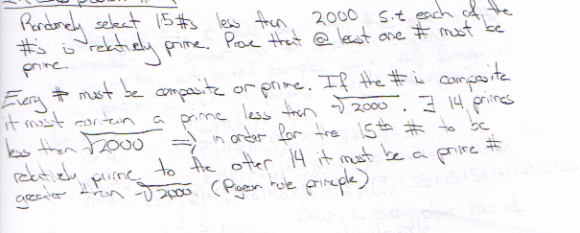


Discussion: This student gets right to the core of this problem. There are 14 primes less than the square root of 2000. If one has 15 relatively prime numbers less than 2000 at most 14 of them contain a prime less than square root of 2000. Therefore at least one contains only primes greater than the square root of 2000 but then it must be prime since two such factors would have product greater than 2000.
Written response: Nice treatment using the pigeonhole principle as well as resources from number theory, in particular, prime factorization.